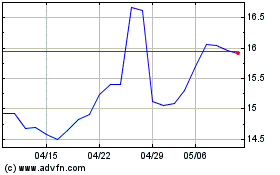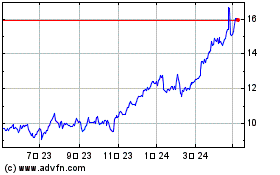By Patricia Kowsmann and Margot Patrick
The coronavirus pandemic has brought a sense of urgency to
Europe's ailing banks to scale up or risk dying.
Around the region's capitals, banks are exploring mergers after
a decade of weak returns. They are drawing plans on how they can
face a prolonged era of low interest rates, a gloomy economic
outlook and souring loans that are expected to rise as borrowers
struggle to keep their jobs and businesses. Mergers are a way to
combine balance sheets while taking out a large chunk of costs,
including by closing duplicate branches and laying off staff.
In Switzerland, UBS Group AG has studied how it could absorb
smaller rival Credit Suisse Group AG. In Spain, which has been
severely hit by the pandemic, CaixaBank SA is buying Bankia SA to
form Spain's largest domestic bank. Another lender, Banco de
Sabadell SA, is also exploring its options, including a domestic
merger, a person familiar with the situation said.
A Sabadell spokesman said the bank has a plan to remain
independent but will study options that increase shareholder
value.
Christian Sewing, chief executive of Deutsche Bank AG, which
last year held merger talks with rival Commerzbank AG that failed,
recently said his bank wants to be part of consolidation once it
improves its profitability. Commerzbank itself -- also struggling
to make money -- might still need to find a suitor.
Many of the conversations are happening internally and have yet
to translate into deal talks or takeover offers. And most
discussions at this stage are around domestic rather than
cross-border deals, which offer less cost synergies and would
require deeper government involvement to push through to
completion.
Chatter about a wave of consolidation in Europe has been going
on for a decade because many countries have a fragmented banking
system with too many banks and returns on equity have been slim or
nonexistent. Action was constrained by issues ranging from
regulatory hurdles to fights over which management team would run a
combined entity. Now, the feeling that something needs to be done
and done soon has never been so strong, according to bank
executives and outside advisers.
European banks' return on equity, a key metric of profitability,
sank to 1.3% at the end of the first quarter from 5.7% at the end
of 2019. Some European banks are struggling to even cover costs. In
the U.S., banks thrived in a stronger economy for years, allowing
them to spend on technology and build up capital without having to
go to shareholders.
"We are in a moment of disruption," said Bankia Chairman José
Ignacio Goirigolzarri. "And when there's disruption, we have to
react to it."
Bankia and CaixaBank, which agreed on a deal two weeks after
saying they were exploring a merger, said it was being driven by
the pandemic and low profitability from persistently low interest
rates.
Bankia nearly collapsed and had to be rescued in 2012 by the
Spanish government, which retained a majority stake. Mr.
Goirigolzarri said the combined entity would have roughly 25% of
Spain's loans and deposits and shave some $900 million from annual
costs. Spain has more bank branches per capita than almost any
major economy, with around 55 per 100,000 people, according to
World Bank data, almost double the figure in the U.S.
Other banks have also stepped up internal conversations, trying
to figure out if they, too, should seek a combination, according to
bank executives and outside advisers. Even the stronger banks with
little appetite for mergers are expecting to get dragged into
takeovers by governments eager to find a savior for their weaker
banks. Others are considering how to position themselves if large
cross-border mergers eventually begin.
"Mergers, right now, are a survival move," said an official at a
Spanish bank. "You need to gain scale to face all the uncertainty
that Covid has brought."
Switzerland's two dominant banks, UBS and Credit Suisse, have
weathered the pandemic better than other large European lenders
because of their focus on global wealth management and a relatively
strong home economy. But the possibility of the two merging, the
subject of perennial speculation, was studied again recently by UBS
as a way to cut costs and stay competitive against U.S. and
European rivals, according to people familiar with the bank.
Multiple hurdles would have to be cleared, and no talks between
the banks are currently under way, the people said. Any deal would
likely have to involve selling business units since Switzerland
makes banks hold more capital if they get too big.
So far this year, European banks have posted relatively stable
results, giving the impression they are weathering the severe
economic contraction well. But that is mainly because governments
are sustaining the economies by paying companies to keep people in
their jobs and getting banks to give borrowers payment breaks on
their loans. Once those programs are lifted, analysts expect a wave
of defaults that could push weaker banks to the brink of
collapse.
That is particularly true for countries more severely hit by the
pandemic, including Spain and Italy, or whose governments don't
have the money to support the economy, such as Greece. In turn,
banks' depressed share prices make it hard for them to raise more
capital from investors. The Stoxx Europe 600 Banks index is down
close to 40% this year. European banks are trading at a fraction of
their net worth, a sign investors doubt their ability to survive or
achieve sufficient profitability. In contrast, U.S. banks are
expected to bounce back more quickly from the pandemic.
"We expect the pain for European banks to really begin next
year," said João Soares, a partner with Bain & Co.'s
financial-services practice. "Until then, banks need to prepare for
the storm."
The European Central Bank, which supervises the largest banks in
the euro area, has recently issued a draft guide on how it plans to
treat some of the common issues in mergers, in an attempt to boost
banks' appetite for deals.
"Before the Covid crisis, the need to adjust costs, eliminate
excess capacity, and restructure the banking sector was very
important," Luis de Guindos, the ECB's vice president, told
reporters recently. He said the pandemic stepped up those needs and
called for banks to consolidate "quickly and urgently."
--Ben Dummett contributed to this article.
Write to Patricia Kowsmann at patricia.kowsmann@wsj.com and
Margot Patrick at margot.patrick@wsj.com
(END) Dow Jones Newswires
September 20, 2020 06:14 ET (10:14 GMT)
Copyright (c) 2020 Dow Jones & Company, Inc.
Deutsche Bank (TG:DBK)
過去 株価チャート
から 3 2024 まで 4 2024

Deutsche Bank (TG:DBK)
過去 株価チャート
から 4 2023 まで 4 2024
